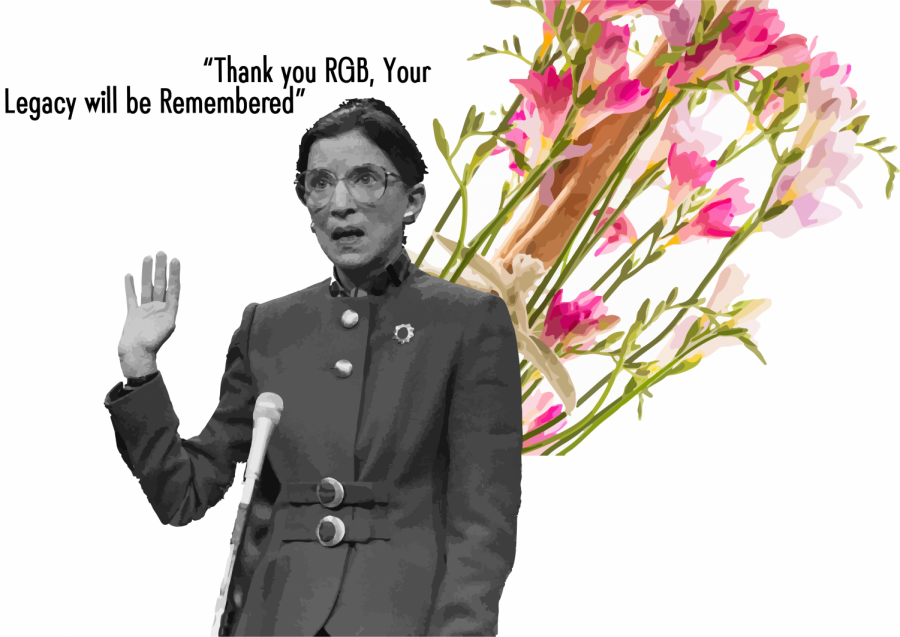Opinion- U.S. lost a lot more than a justice when Ginsburg died
A depiction memorializing Ruth Bader Ginsburg in her passing sits in front of a a bouquet of Freesia, her favorite flower. Ginsburg died on September 18, leaving questions about the future of the Supreme Court, and the rest of the country. “The U.S. lost a judicial icon and historic trail blazer,” sophomore and columnist Shreya Srivathsan. “She was known for her tireless efforts of fighting for women’s rights, race, gender equality and LGBTQ+ rights.”
November 4, 2020
The Path to Supreme Court
The U.S. lost a judicial icon and historic trail blazer, Ruth Bader Ginsburg, September 18, 2020.
Known by her nickname as The Notorious RBG, Ginsburg was born on March 15, 1933 in Brooklyn, New York to her jewish parents Celia Amster Bader and Nathan Bader.
After graduating first in her class at both Cornell and Harvard Law School, she was appointed by Bill Clinton to the Supreme Court in 1993.
She was known for her tireless efforts of fighting for women’s rights, race, gender equality and LGBTQ+ rights.
Career on the Supreme Court
As a supreme court justice, Ginsburg played a critical role in landmark cases.
In 1996, the supreme court took the case U.S. vs. Virginia, regarding the Virginia Military Institute’s “male-only” admission policy. The 7-1 decision ended against Virginia barring the discrimination, and building a president to upend gender discrimination, specifically in education.
Now while Justice Ginsburg’s joined by a clear majority of the other justices, the wasn’t always the case.
In the case of the Obergefell v. Hodges (2015), the opinion, arguably just as much of a landmark case in its complete assertion the the right to marry applies equally to same sex couples, was only won on 5-4 majority. It was rulings like that this one specifically that put the United States on the cutting edge of progress, and it’s unfortunately a sharpness we could lose in her absence.
Progress, though, often times didn’t just come from her majority opinion, but often times when she disagreed with the rest of the court in her dissents.
In the case Bush v. Gore (2000), a case which took on the issue of a vote recount in Florida that ended up deciding the election, Justice Ginsburg gave a fiery speech detailing the crime of both the court’s ruling, and the nature of its involvement in the first place.
This case proved important for Ginsburg’s career for two reasons: it cemented a legitimate informal power that Ginsburg had in swaying the hearts and minds of people through her dissents, and it formed a worse case scenario for what could happen in the future.
The Road Ahead
In a presidential race as heated as this one, the possibility of this election hinging on a similar recount is eerily high.
The current hearings for Ginsburg’s replacement are setting up to be some of the most partisan hearings to ever happen within the context of the judicial confirmations.
Even worse though, these disputes set up an unfortunate reality of conflict that could far outlive a judicial context. More and more, harsh reactionary tactics like D.C. statehood and packing the court have become more realistic, setting up the U.S. for an escalating arms race of political warfare in Washington.
The future of politics as we know it hangs in the balance.
The Supreme court of the United States sits as one of the most important, non-partisan institutions that we have. If that credibility is lost, one of the founding pillars of our democracy risks degradation, not to mention that it will control the fate of social issues that are just as close to students as they are to the rest of society- like healthcare and immigration.
Further, her death brings a whole new era of political turmoil by risking polarizing institutions like congress to an unprecedented degree.
It’s easy to feel like a lot of Ginsburg’s progress is soon to be undone, but it’s important to also acknowledge that her legacy will forever have a lasting imprint on the judicial branch.










Senthil Kumar Palani
Nov 13, 2020 at 1:47 am
Very impressive article to read. I’m waiting to watch the movie “On the Basis of Sex” to learn more about the Ruth Bader Ginsburg ‘s legacy .
By the way, great job guys.